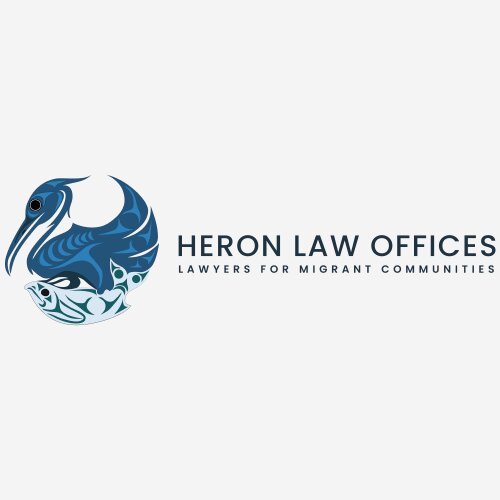Best Permanent Residency Lawyers in Burnaby
Share your needs with us, get contacted by law firms.
Free. Takes 2 min.
List of the best lawyers in Burnaby, Canada
About Permanent Residency Law in Burnaby, Canada
Permanent Residency (PR) in Burnaby, Canada, allows immigrants to live, work, and study in Canada indefinitely. While the city itself does not have distinct laws regarding permanent residency, it operates under the broader regulations set by Immigration, Refugees and Citizenship Canada (IRCC). PR status comes with certain privileges and obligations, distinguishing it from temporary resident status. Burnaby, known for its multicultural environment and robust community services, is considered an attractive place for immigrants to settle.
Why You May Need a Lawyer
Individuals seeking permanent residency may encounter various complexities that require professional legal assistance, such as:
- Understanding eligibility criteria and choosing the right PR pathway (e.g., Express Entry, Family Sponsorship, Provincial Nominee Program).
- Submitting accurate and complete application packages to avoid delays or rejections.
- Navigating the appeals process if an application is denied.
- Clarifying legal implications of changes in personal situations, like marriage or employment change, on PR status.
- Addressing criminal inadmissibility issues that might affect PR application.
An experienced legal advisor can provide personalized guidance and increase the likelihood of a successful application.
Local Laws Overview
Permanent residency applications in Burnaby are primarily governed by federal laws, given the city's adherence to national regulations. The Immigration and Refugee Protection Act (IRPA) and its regulations are essential legal frameworks. Key aspects include:
- Criteria under the Economic Class programs, which prioritize skilled workers.
- Family reunification through the Family Class sponsorships, allowing PRs to bring close family members to Canada.
- Obligations of permanent residents, such as residency requirements and compliance with Canadian law.
- Access to provincial programs like the British Columbia Provincial Nominee Program (BC PNP), which offers tailored pathways for PR status.
Frequently Asked Questions
What is the processing time for a permanent residency application?
Processing times vary depending on the program or category. Typically, Express Entry applications are processed within six months, while other streams may take longer.
Can I apply for permanent residency while living outside Canada?
Yes, many individuals apply for PR from outside Canada using various programs such as Express Entry or Family Sponsorship.
What are the common requirements for permanent residency eligibility?
While requirements differ by program, commonalities include language proficiency, relevant work experience, education credentials, and a police clearance certificate.
Do I need a job offer to apply for permanent residency?
Some programs, like Express Entry's Federal Skilled Worker Program, do not require a job offer. However, having one can enhance your application, especially under the Provincial Nominee Program.
How does the Provincial Nominee Program (PNP) work in Burnaby?
The BC PNP allows provinces to nominate individuals for PR based on local economic needs. Candidates must meet specific criteria set by British Columbia.
What happens if my PR application is refused?
If a PR application is refused, the applicant may appeal the decision, submit a new application, or seek judicial review based on the grounds of the refusal.
Can a permanent resident apply for Canadian citizenship?
Yes, PRs may apply for citizenship after living in Canada for 1,095 days out of the last five years, among other criteria.
Are permanent residents entitled to government benefits?
PRs can access most social benefits, including healthcare. However, they may not be eligible for certain grants or student loans immediately upon receiving PR status.
Can I leave Canada after obtaining permanent residency?
Yes, permanent residents may travel outside Canada but must meet residency obligations (at least 730 days in Canada over five years) to maintain their status.
What documentation is needed for a PR application?
Typically, documents required include identification, language test results, educational assessments, work experience proof, and police certificates. Specific requirements depend on the chosen program.
Additional Resources
For further information and assistance, consider reaching out to:
- Immigration, Refugees and Citizenship Canada (IRCC) - Responsible for managing PR applications and policies.
- BC Provincial Nominee Program (BC PNP) - Offers residency pathways specific to British Columbia.
- Local community organizations in Burnaby, such as the Burnaby Multicultural Society, which provides support and information for new immigrants.
- Legal aid services, including non-profit organizations offering guidance on immigration laws in Burnaby.
Next Steps
If you require legal assistance with your permanent residency application, consider the following steps:
- Conduct thorough research to identify experienced immigration lawyers or consultants in Burnaby.
- Schedule consultations to discuss your case and receive personalized advice.
- Prepare necessary documentation beforehand to maximize efficiency in consultations.
- Evaluate the lawyer's expertise, communication style, and fees before committing to their services.
- Stay updated on immigration laws and programs by regularly reviewing official government websites and attending informational sessions.
Professional legal assistance can help navigate the complexities of permanent residency applications, ensuring that you meet all requirements and deadlines effectively.
Lawzana helps you find the best lawyers and law firms in Burnaby through a curated and pre-screened list of qualified legal professionals. Our platform offers rankings and detailed profiles of attorneys and law firms, allowing you to compare based on practice areas, including Permanent Residency, experience, and client feedback.
Each profile includes a description of the firm's areas of practice, client reviews, team members and partners, year of establishment, spoken languages, office locations, contact information, social media presence, and any published articles or resources. Most firms on our platform speak English and are experienced in both local and international legal matters.
Get a quote from top-rated law firms in Burnaby, Canada — quickly, securely, and without unnecessary hassle.
Disclaimer:
The information provided on this page is for general informational purposes only and does not constitute legal advice. While we strive to ensure the accuracy and relevance of the content, legal information may change over time, and interpretations of the law can vary. You should always consult with a qualified legal professional for advice specific to your situation.
We disclaim all liability for actions taken or not taken based on the content of this page. If you believe any information is incorrect or outdated, please contact us, and we will review and update it where appropriate.










